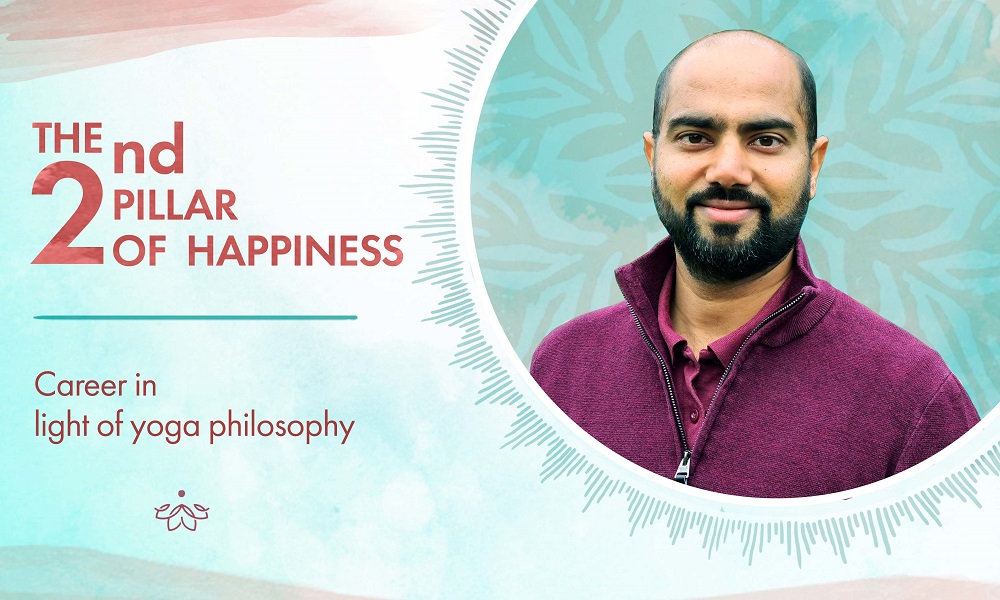The idea of a career might seem contradictory to what you believe yoga philosophy teaches us. However, career or productivity is an essential part of our human experience. Several ancient Indian texts talk about four stages of life, one of which focuses on the productive years that we now would call our career.
The Ashrama Upanishad defines the four life stages as
- Brahmacharya (student),
- Grihastha (householder),
- Vanaprastha (retired) and
- Sannyasa (renunciate).
There are varying definitions of what age range each of these stages should cover. When the philosophies were developed, life expectancy was shorter than it is now.
The most common definition is that the first twenty-five years of our life should be spent developing and studying. From the age of twenty-five until the age of fifty we should fulfill the duties of a householder, and after the age of fifty we should start to hand over household responsibilities to the next generation, take an advisory role, and gradually withdraw from the material world. The final stage, Sannyasa, is defined by the renunciation of material desires. In this stage, we are supposed to become an ascetic, possibly leaving behind any meaningful property or home, and focusing solely on attaining moksha, peace, and a simple spiritual life.
Many of you will be in the stage of Grihastha, or householder. You are earning a living and perhaps raising a family. In this stage we contribute to society with our work and our career. Unlike the recommendation given in the ancient texts, most of us work until at least the age of sixty-five before retiring.
It’s important to make educated and conscious choices about our career, or about what our productivity looks like. We spend a lot of time every day, every week, and every year on it. This is the time we spend on being productive, bringing value to society, and taking responsibility for our duties (dharma). Our productive time provides the means for our lifestyle, and it gives meaning to our life.
This makes our career is a very important building block for a happy and content life.
What is a career?
When asked to define what a career is, most people suggest
- a job
- a business
- something you do to pay the bills
- something that helps you make money to enjoy pleasures
- spending time doing what you like and being paid for it
However, having a career is not something that is necessarily connected to earning money. A homemaker also has a career.
So, if a career is not primarily about making money or having a job, what is the correct definition of 'career'? In light of yoga philosophy and my personal experience, I believe 'career' can be best defined as:
- Personal productivity
- Bringing value to society
- Taking responsibility

Discover yoga philosophy principles to boost your happiness
Get free access to a life-changing series of 6 webinars with Arhanta Yoga founder Ram Jain
The Yogic Principles of Career
Dharma – your duty, role, and purpose
Dharma means duty. Some duties, or roles, we get when we are born. Some roles we choose. A career is a role we choose. According to yoga philosophy, it is of high importance to fulfill our duties. Our duties bring us responsibilities and purpose.
Karma Yoga – doing your duty at your best
Doing our duties at our best, without ego or attachment, is Karma Yoga. Despite the common misconception, Karma Yoga is not about giving free or underpriced service, or agreeing to an unfair exchange.
Free will – your ability to choose
The capacity to choose gives us the responsibility to make the right choice.
Read more: Karma & Dharma: Are you Doing it Right?
How to feel happiness from your career
Do you work for your hourly wage or do you work for the company and the greater good it brings to society?
There is a famous parable that illustrates this point: A traveler came upon three men working. He asked the first man what he was doing and the man said he was laying bricks. He asked the second man the same question and this man said he was putting up a wall. When he got to the third man and asked him what he was doing the man said he was building a cathedral where people could come to be close to God.
Essentially, they were all doing the same thing. But the attitude and sense of purpose were very different between these three men: The first man had a job. The second man had a career. The third man had a calling.
Ask yourself the following questions:
- Does your career work in sync with your other duties?
- Does your career support your lifestyle?
- What are your minimum expectations for job/career satisfaction?
It is important that the career you choose fits with the other five pillars of happiness, with your other duties and your goals in life.
In order to experience happiness in your career, you must know what exactly is enough for you to feel satisfied with your career. Until you have defined your expectations, you can't know if they are fulfilled.
Three steps that will add happiness to your career
- Choose a career that will challenge you to expand, grow, and evolve.
- Continue to plan and work towards developing your career. Don’t wait for things to fall into place.
- Review and revise your career plans and expectations as they may change over time.
In order to balance your spirituality with the other pillars of your life, you can learn more about all the pillars in this blog series:
Health: Holistic Health in light of Yogic Philosophy
Relationships: Relationships in Light of Yoga Philosophy
Leisure: Leisure in Light of Yoga Philosophy
Spirituality: Spirituality in Light of Yoga Philosophy
Lifestyle: Lifestyle in Light of Yoga Philosophy

